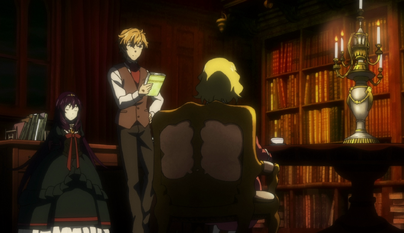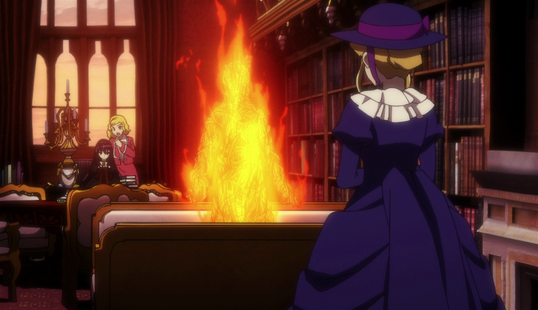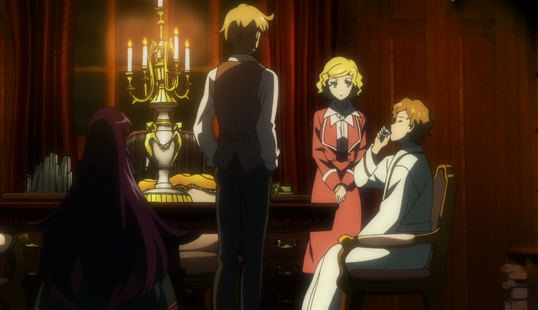| Book of the Eleusis Ritual | |
|---|---|
 | |
|
Original Name |
エレウシスの祭儀書 |
|
Romanized Name |
Ereushisu no Saigi-sho |
|
Author |
Unknown |
|
Debut |
|
|
Powers |
It resurrects the dead. |
|
User |
|
|
Status |
Inside the Labyrinth Library |
Book of the Eleusis Ritual or Ελεύσινα is a Phantom Book used by Hugh to resurrect Armand. It's present in the Book of Connection story.
It’s and small and old book whose pages are made of decorated parchment, written in a language similar to the one seen in the Book of Connection.[1] In the anime, the book has a beautiful golden cover inspired by the Eleusinian Mysteries.[2]
Background
The Book of the Eleusis Ritual is contained inside the Labyrinth Library. Eleusis is a Greek town where initiations known as the Eleusinian Mysteries were held every year for the cult of the goddesses Demeter and Persephone in ancient Greece.[3][4]
Powers
The Phantom Book grants the power of resurrecting the dead. It brings a person back to life, provided that he does not eat the fruits of the Underworld. For instance, Armand was burned to death due to the spell of the Book of Connection, but he started moving as soon as Hugh applied the secret techniques and finished the ceremony described in the Book of the Eleusis Ritual.[1] In the anime, Armand resurrected from ashes after an intense flash.[2] The person affected by the Phantom Book feels indisposed and dizzy for a while.[1]
Plot
Armand is engaged to Lianna thanks to the Book of Connection, but she thinks he’s cheating on her. Her anger triggers the spell of the Phantom Book, causing magical branches to wrap around Armand. He screams as his body is consumed by fire. Dalian exposes the lock on her chest, while Hugh prepares to use the golden key in his right hand.
Lianna leaves the Disward mansion after watching Armand’s death. Hugh was carrying an old book under his armpit. He performs the ceremony described in the Book of the Eleusis Ritual to resurrect Armand. The latter slowly opens his eyes. He was feeling half dead, looking like a drunkard.[1]
In the anime, Hugh and Dalian plan to resurrect Armand before they let Lianna in. He's instructed to avoid the fruits of the Underworld.[2]
Trivia
- In the anime, the cover reads Ελεύσινα,[2] although Ελευσίνα is the Greek equivalent to Eleusis.[3]
- Demeter is the goddess of agriculture, harvest, grain, vegetation and forests, also associated with the seasons and the fertility of the earth.[5] Persephone is her daughter, the goddess of the underworld, springtime, flowers and vegetation.[6]
- Dalian affirms Armand couldn’t be resurrected if he ate the fruits of the Underworld.[1] In Greek mythology, the rule was created by the Fates or Moirai, the incarnations of destiny.[7] Persephone was abducted by Hades, the ancient Greek god of the underworld[8], who tricked her into eating pomegranate seeds. Therefore, Persephone was obliged to spend part of the year in the Underworld.[4]
- The Eleusinian Mysteries are the most famous of the secret religious rites of ancient Greece. The ceremonies depicted Persephone returning from the Underworld as a resurrection. Furthermore, her time with Hades represented the winter, when Demeter was unhappy, neglecting the cultivation of the earth. When Demeter was living with her daughter, plants would grow in abundance.[4]
- The Book of the Eleusis Ritual was used to resurrect Armand, who died from a spell coming from the Book of Connection, another Phantom Book associated with Greek mythology and the Underworld.[1]
References
|




